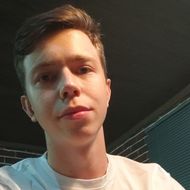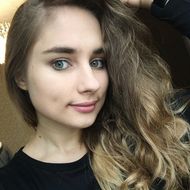'HSE and VK's Engineering and Mathematics School Lets You Gain Serious Work Experience While Studying'
.jpg)
It has been more than two months since HSE and VK launched a new collaborative educational project: the Engineering and Mathematics School (EMS) based at HSE MIEM. Competitive enrolment was announced in Moscow for HSE students wishing to enter EMS. Those who were admitted are now working at EMS workshops on actual business assignments from VK covering the most in-demand areas of IT, while also attending signature courses led by HSE and VK experts. Several students of the school's first enrolment batch have shared their impressions with the HSE News Service.
The training offered by EMS falls under HSE's core educational programmes. The main areas of training and practice at EMS include machine learning, high-load systems, and AI. Based on these key areas, the Engineering and Mathematics School's four workshops focus on compilers and high-load applications, artificial intelligence hardware, applied AI, and 'Robbie' virtual platform solutions. The latter workshop is hosted by the St Petersburg School of Physics, Mathematics, and Computer Science.

Mikhail Fedosov, Information Security Bachelor's Programme, workshop on compilers and high-load applications
'When I first learned about the Engineering and Mathematics School, I did not believe I had a chance. But then I pulled myself together and sat down to do a test assignment that involved fixing a PHP code and running it as KPHP, the programming language we are currently developing in our workshop.
It took me quite a while to complete the assignment, as I spent a lot of time fixing the source code. But as a result, I was invited to an interview! In a nice and friendly atmosphere, the project managers interviewed applicants to assess their motivation for joining EMS. For me, having participated in open-source projects before was an advantage. I told the interviewer that I had coded a discussion forum for the HSE student community (vyshka.club). Although the project was not in high demand, the learning and hands-on experience helped me complete the EMS test assignment. I believe that I got accepted thanks to these factors.
When listening to the presentations on each workshop, the one on compilers immediately got my attention. I already had some experience with neural networks, but this topic is very popular—compilers are a totally different matter! Compilers are the new black. At our first session, we met the project curators from VK Alexander Kirsanov and Danila Ovchinnikov, the project manager from MIEM Vladimir Bashun, and other project participants to learn what we would be working on. All these people are real geniuses! We get together twice a week for consultations and interim results assessment. In addition to this, we take courses in advanced C++, web development and compilers. These consist of lectures, seminars, and eventually, final exams.
We do not split into teams—we are all one family. Together, we formulate questions for VK’s business units. One of our main objectives is to make KPHP accessible to beginners. My fellow students at the workshop are awesome people who are actively involved in collaborative and individual projects. There is no time to be lazy.
EMS offers an excellent opportunity to gain some serious work experience while studying at HSE. I really appreciate the amount of practical, hands-on work. Generally, I’m now doing what I love. As a student, you often think that some disciplines in your curriculum are overly theoretical. But at the workshop, you can see their practical value.
For me, getting accepted to the workshop was an achievement, and it is important to keep the bar high. My next big goal is to successfully defend my project before VK in winter. I am glad to have this opportunity to study compilers in depth and to understand whether I want to continue learning programming languages and working on open-source projects. It feels really good to see your project benefit other people. The KPHP project has brought together the best developer community, and its greatest value lies in sharing knowledge and expertise.'

Ekaterina Gimranova, Data Science Master's Programme, workshop on applied AI
'I learned about enrolment in the Engineering and Mathematics School from a post on VK. I thought that it was a great opportunity to apply what I had learned at the university to real-life tasks under the supervision of VK’s developers and to upgrade my skills in ML. At the time of applying, I did not have a full idea of the format of the workshops, but I expected it to be productive.
The selection process consisted of two stages: a test assignment and a technical interview. In the first stage, we could choose an area in ML, either CV (computer vision) or NLP (working with text and audio). Since I am more interested in the latter, I chose the relevant test assignment, which was to design a model for dividing a Russian text into paragraphs and sections based on their semantic load. I liked the assignment, but this was the first time I faced such a task, and I was not sure at first how to tackle it.
It did not take me long to decide which workshop to enrol in. I chose applied AI, since I study Data Science at HSE and plan a career in ML. At the moment, all our homework is to be done individually, but group-based projects are expected soon.
I really like the instructors and the project I'm working on. Our curators from VK always keep in touch and help us sort out any difficulties we may have. Of course, I would like to complete all the project assignments successfully. But for me, the value of participation lies not so much in the output, but in the learning and skill-building process.’

Anna Polupanova, Applied Mathematics and Information Science Bachelor's Programme (HSE University-St Petersburg), workshop on virtual platform solutions
'When I learned about the launch of EMS, I decided to apply for the workshop in which we would develop a platform for students to work on machine learning tasks. I was interested in this particular topic, in working as part of a team, and also in the stack of technologies to be used.
The selection process for our workshop consisted of three stages: solving test problems to demonstrate our knowledge of the programming language to be used in the project, an interview with a mentor whom you could ask questions about the project, and an interview with the VK team. They asked me questions to test my knowledge of the language and logical thinking, and to learn about my previous experience. My knowledge from my university courses was sufficient to pass all three stages, because we had engaged in many student projects and had a really good Java course.
Now, I am working at EMS as part of a five-person team supervised by HSE faculty and VK curators. Our mentor from HSE has been helpful in getting us organised as a team and informing us about various aspects of the project. I hope our team will succeed in all assignments, and I will gain new and useful experience.'

Andrey Rozhin, Information and Communication Technologies and Systems Bachelor's Programme, workshop on AI hardware
'I have recently been studying machine learning on my own, so when I learned about enrolment in EMS, I thought this would be a great opportunity to learn more about this topic from professionals.
During the selection process, I showed my competence in C++. Then there was an interview with a VK representative—we discussed my experience and the things I knew how to do. Next, I was asked to complete a rather challenging assignment about algorithms. I liked it because I had expected a standard test that other companies give you in interviews, but this kind of task was new to me. During the selection process, I could already see [VK's] unconventional approach to business.
I inquired about the workshops and immediately chose the one on AI hardware. It had all I needed: low-level programming, efficient algorithms for neural networks, and the unique opportunity to use domestically produced chips. In addition to this, I had long wanted to know more about optimisations for various hardware platforms. By the time I was selected to EMS, I had already built my own library for training and inference of neural networks in C++, so I had a good understanding of what it was all about and felt confident.
Our educational courses make it possible for us to practice before we take up real assignments in workshops. I like that the teachers answer students' questions readily and in detail and solicit feedback after lectures to make their course even better. Saying that homework is challenging would be an understatement, but this is good, because it gives you something to think about and helps build your skills, especially those needed to search for information.
We have big plans and a lot of work ahead of us. I hope that we will complete all the project assignments and successfully present our results.'
See also:
The First Year Results of HSE University and VK Engineering and Mathematics School
Students from the Engineering and Mathematics School, a joint educational programme of HSE University and VK, defended their projects at the VK Moscow office. The students presented technology for generating animated 3D characters, a framework for the PHP language, an open service for creating neural networks and several other innovative IT solutions.
HSE University Students and Graduates Among Winners of VK Cup ‘22/23
On February 5, the finals and award ceremony of the VK Cup ‘22/23 IT championship took place. The competition comprised two qualifying stages and one final stage. There were more than 5,000 applications for the qualifying stages, with a total of 80 participants making it to the finals.
‘IT Is an Untapped Mine of Professions’
As adept at mathematics as HSE MIEM graduate and Twin3D Chief Engineer Nikita Zimenko was, he turned out to be even more inquisitive, with the result that he fell out of love with math and set his sights on digital technologies instead. In this interview with Success Builder, he explained how to conduct research on astromechanics, what 3D animators do with the human body and whether metaverses have a future.
IT at HSE Perm: From Academic Projects to Commercial Research
Aleksey Kychkin, Head of the Laboratory of Interdisciplinary Empirical Studies, spoke to the HSE Look about his background, industry projects the lab has been doing, and student involvement in research.
HSE University to Host FIT-M 2021 International Scientific Forum
On December 16–18, the FIT-M 2021 International Scientific Forum on the Application of Information Technologies and Computer Simulation in Scientific Research and Engineering and Industrial Business will be held at HSE University. The forum will have a mixed format, with events taking place both offline and online.
‘It Was a “Survival Course” in Software Engineering’
It is said that a young professional must choose between an academic career or a career in business. Faculty of Computer Science alumnus and Ilya Segalovich scholarship recipient, Mikhail Fomichev, succeeds in both. Mikhail told the HSE News Service about his work at HSE University and Yandex.


